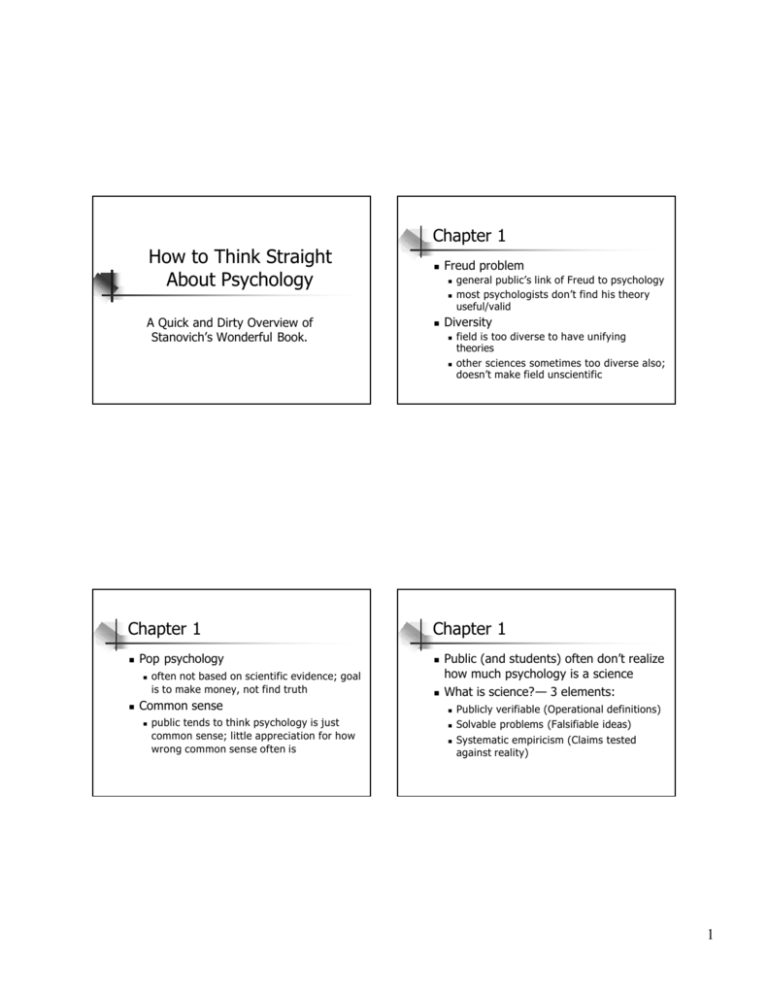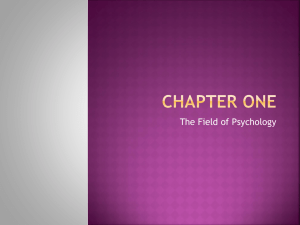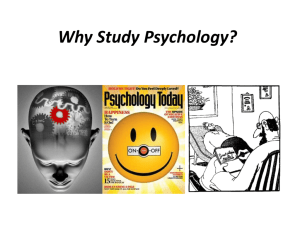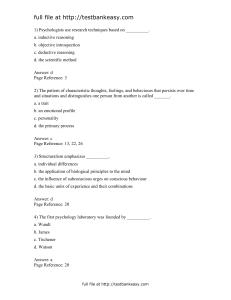Stanovich overview - Weber State University
advertisement

How to Think Straight About Psychology Chapter 1 n Freud problem n n A Quick and Dirty Overview of Stanovich’s Wonderful Book. n Diversity n n Chapter 1 n Pop psychology n n often not based on scientific evidence; goal is to make money, not find truth Common sense n public tends to think psychology is just common sense; little appreciation for how wrong common sense often is general public’s link of Freud to psychology most psychologists don’t find his theory useful/valid field is too diverse to have unifying theories other sciences sometimes too diverse also; doesn’t make field unscientific Chapter 1 n n Public (and students) often don’t realize how much psychology is a science What is science?— 3 elements: n n n Publicly verifiable (Operational definitions) Solvable problems (Falsifiable ideas) Systematic empiricism (Claims tested against reality) 1 Chapter 1 n n What science studies—only things that can be studied scientifically. Leave philosophical questions for philosophers. Some questions now unanswerable may become answerable in future (technology) Chapter 2 n n n Quality of evidence important—not all evidence equally compelling; how well was study designed and carried out, are measures valid were data analyzed correctly, are conclusions justified by data Many experiments lack proper control groups or procedural control Chapter 2 n n Predictions must be (1) specific and (2) must predict both what will and will not happen Why do some people believe unproven alternative medicine claims but are doubtful about standard medicine? Chapter 2 n Evidence vs. personal beliefs: n n scientific approach goes with evidence, even when not what would want to believe Scientists can admit uncertainty; many others don’t want to show such “weakness” because support of public might decrease (if she doesn’t have all the answers, why buy his book?) 2 Chapter 2 n n n Theory generation is easy; creating testable hypotheses is difficult Falsifying a theory doesn’t mean it is completely wrong; often just needs modifying Ex.: if parts of evolution theory need modifying, it doesn’t weaken overall theory Chapter 3 n n Operationism—concept must be measurable; linked to behavior Essentialists want to define everything first; operationists proceed and research supplies meaning of concept Chapter 3 n n Essentialism—quest to find ultimate explanations in terms of essence of concept Ex.: How did the universe begin (ultimate cause); What is essence of intelligence? Chapter 3 n n Terminology problem: if use everyday words, common definitions different from how psychologists use same terms If use new terms for precision, get criticized for using jargon 3 Chapter 3 n n Operationism & phrasing questions— tendency for people to keep changing operational definition if research gives answer they don’t like Ex.: can computers think, have emotions; moving target of definition Chapter 4 n n Testimonials—tend to be vivid, thus having more impact than they should; don’t prove cause-effect (no controls) E.g.: silicone breast implants—are they safe? Testimonials vs. scientific evidence Chapter 4 n n “it is my clinical experience”— subjective, can’t disprove Case studies—good for ideas, hard to pin down explanations; placebo effects problems; hard to make cause-effect judgments Chapter 5 n n n Problems interpreting correlation: 3 rd variable and directionality Ex.: 3 rd var. problems: being in band & good grades; school breakfast & good grades; bad child name & psych. Problems Ex.: directionality problems: television violence & aggressive children 4 Chapter 6 n n n Necessity of proper controls Ex.: Clever Hans, facilitated communication Need to properly assess control information; e.g. confirmation bias Chapter 7 n Natural observations: can’t “pry apart coincident variables; can’t make causeeffect conclusions Chapter 6 n n Folk wisdom—formed from everyday observations; subject to many cognitive errors Ex.: moon effects, old sayings Chapter 8 n n n “Einstein syndrome”—idea that science usually progresses through giant intellectual leaps Public may not appreciate slow progress that characterizes normal science Connectivity principle—new theories must still explain old findings (but better) along with new phenomena 5 Chapter 8 n n Converging evidence—author used my favorite 2 examples: tv violence & aggression, and smoking and health problems Progression from less to more powerful methods (e.g., case study, correlational, field experiment, lab study) Chapter 10 n n n “person who” evidence— “That can’t be true, because I know a person who …” Ex.: SAT scores can’t predict college grades, because I know (or I am) a person who . . . “ Public misunderstanding of why scientists make mainly probabilistic statements Chapter 9 n n n n Single vs. multiple causation Some people prefer one-factor reasoning Many people revert to single causation when dealing with strongly held opinion or emotional issue Sometimes only interactions can explain effects Chapter 10 n n n n Human errors in thinking about probabilities: Tend to overweight case info and underweight base rate info Sample size—tend to overweight diagnostic info and underweight sample size info Gambler’s fallacy 6 Chapter 11 n n n Tendency to find patterns even in randomness; e.g., illusory correlations E.g.: Rorschach test Tendency to find causal explanations for correlations; e.g., just world hypothesis Chapter 11 n n n n Actuarial vs. clinical prediction Clinicians—tend to use denial when confronted with such evidence E.g., “Moneyball” about actuarial vs. managerial decisions in baseball People in general overconfident in own predictions, thinking they will beat the averages Chapter 11 n n n Coincidence—specific event vs. all possible coincident events E.g., presidential coincidences, personal coincidences Role of memory—availability heuristic Chapter 12 n n n n n Psychology’s image problems Freud problem Media representations of psychology— heavy on pop psych & parapsychology Self-help literature—not always based on experimental literature; recipe knowledge Media—driven not be search for truth, but for what will get a good audience 7 Chapter 12 n n n Some psychologists represent the field poorly: non-scientifically based therapies, desire to sell a lot of books, guild focus of clinical psychology (licensure over experimentation) APA vs. APS Political considerations: people don’t want to cede to psychologists option to say what is true about human behavior 8










